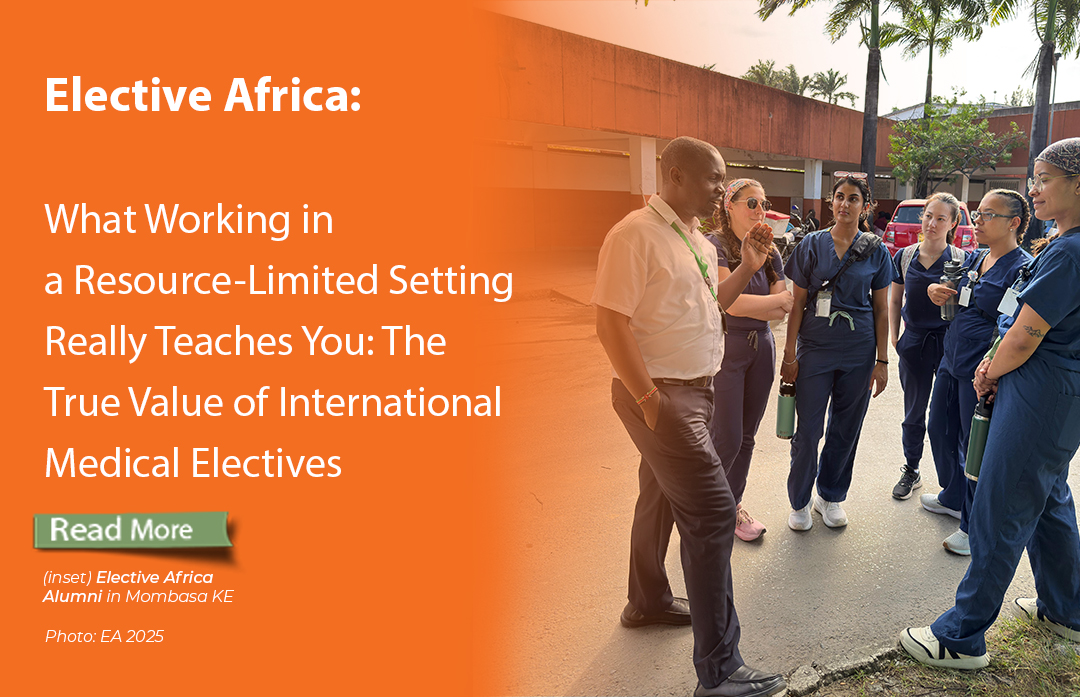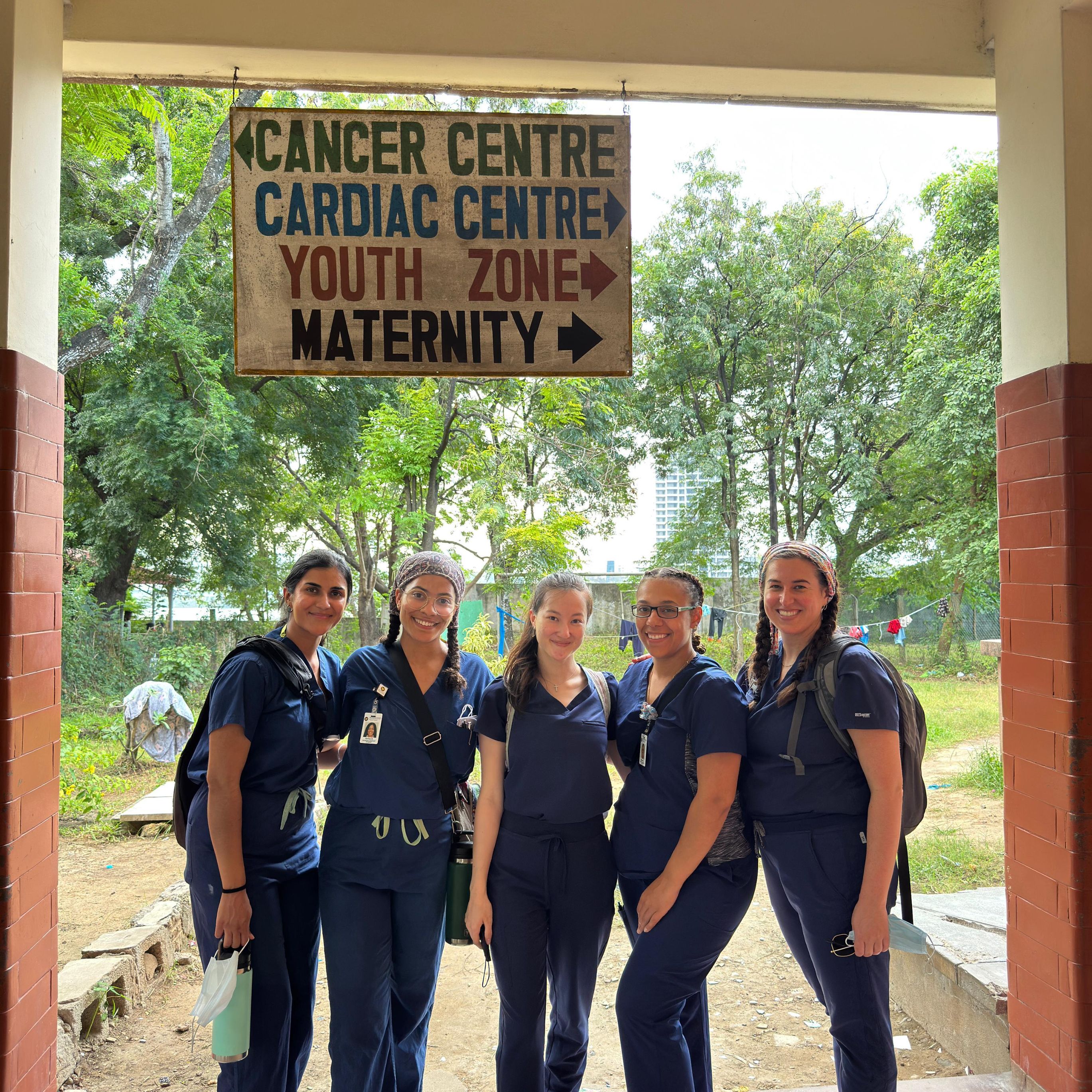 Visit Elective Africa website Visit Elective Africa website
|


|
|
|
| The True Value of International Medical Electives |
 |
|
Ask any healthcare professional about the moment they felt their training truly came to life, and you’ll often hear about experiences that happened outside the classroom and sometimes far from home. For many medical students, international electives are that defining moment. Not because of flashy facilities or high-tech equipment, but because of the lessons learned when resources are limited and critical thinking becomes a daily skill.
At Elective Africa, we’ve seen it time and time again where students arrive unsure of what to expect and leave with a deeper understanding of medicine, teamwork and themselves. So what makes international medical electives in resource-limited settings so impactful? Let’s break it down. Back to top |
| Learning to Do More with Less |
 |
|
One of the first things that stands out to interns during their hospital placements in Kenya or Tanzania is how much clinicians achieve with limited resources. Whether it’s a shortage of diagnostic equipment, fewer staff or stretched medication supplies, healthcare professionals rely heavily on their clinical judgment, observation and experience. This is where students begin to sharpen their hands-on clinical skills. From working with teams in busy wards to following up with patients, you begin to notice patterns, ask better questions and appreciate the value of a thorough physical exam. Even small tasks like learning how to take vitals properly, reading a patient’s chart in a different format or observing the triage process start to feel significant. Because in these settings, every action counts and every bit of information has weight. Enhancing Clinical Decision MakingAnother major shift that happens during an international elective is how you begin to view clinical decision-making. In many Western hospitals, the pathway is clear: run labs, order scans, consult specialists. But in many of the hospitals where Elective Africa places students those tools might not always be available. Here, you learn that decision-making isn’t just about what the books say, it’s about what’s possible for the patient, given their situation. You will start to ask critical questions like:
|
| Medicine Is Also Culture, Communication and Community |
 |
|
It’s easy to forget that medicine isn’t practiced in a vacuum, it happens within a community and every community has its own beliefs, barriers and strengths. Many interns are surprised by how much they learn from simply listening and watching how local doctors communicate with patients, understanding how families make decisions together or how cultural beliefs shape the way illnesses are understood. You start to understand why cultural humility matters. Why body language, tone and sensitivity to local customs are as important as any clinical skill. And this learning isn’t just limited to the hospital. Through volunteer and community outreach activities, you also get a deeper sense of the lives behind the hospital wards. Back to top |
| Structured Support Makes the Difference |
 |
|
It’s important to note that these life-changing lessons don’t just happen on their own. Elective Africa programs are designed with structure in mind, starting with a comprehensive orientation at the hospital that covers everything from patient confidentiality to etiquette in the wards. Each intern is paired with local mentors who guide you through their rotations in your departments of choice and are available for questions, reflections and real time feedback. And it doesn’t end at the hospital. Global health tutorials and weekly check-ins with staff give you space to process what you’re seeing, ask questions and connect it back to broader issues in global healthcare. Back to top |
| Real Growth That Shows Up Long After the Internship Ends |
 |
|
What’s most powerful about international electives is how the impact follows you home. Students leave with more confidence in their clinical reasoning, more clarity in their career paths and a much better understanding of how healthcare systems differ around the world.
Many go on to write about their experience in personal statements or talk about it in medical school interviews. Others use their mentor evaluations and completion certificates to earn academic credit or fulfill elective requirements at their home universities. But beyond all that, what stays with you is the mindset of being ready to adapt, listen, think critically and to serve with empathy no matter where you end up practicing. Back to top |
| Conclusion: More Than Just an Elective |
 |
|
During your international medical elective, you will learn how to think on your feet, ask the right questions, and work with what’s available, not just what’s ideal. These are medical skills, built day by day in busy wards, during conversations with local teams, and in the moments where you have to figure things out without relying on technology.
At Elective Africa, we don’t offer a one-size-fits-all experience. Each placement is a learning environment carefully supported, intentionally structured, and grounded in the realities of the local health system. Back to top |
| Ready to Take the Next Step? |
 |
|
Whether you’re looking to complete your medical elective requirements, pursue clinical hours, or simply seek to become a more grounded and global-minded healthcare professional, an elective abroad with Elective Africa offers an unmatched opportunity to develop hands-on skills and clinical decision-making in resource-limited settings.
Visit www.electiveafrica.com to explore our programs in Kenya and Tanzania, and take the first step toward learning in a way that truly prepares you for the future of healthcare. Back to top |
|
|

 7 2025
7 2025